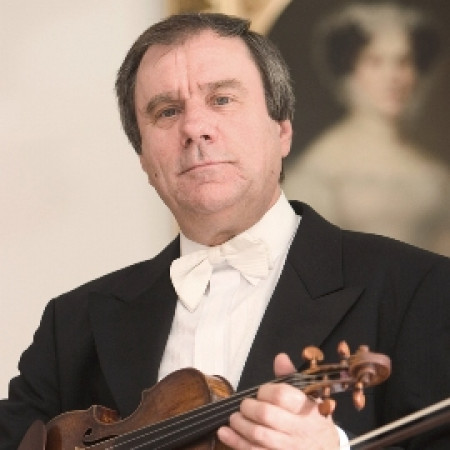
30 September 1944, Kőtelek – 7 December 2024, Budapest
János Rolla was taught by Mária Zipernovszky at the Béla Bartók Specialist Music School in Budapest between 1957 and 1962, and by Dénes Kovács at the violin class of the Liszt Academy between 1962 and 1967. In 1969 he came third in the violin competition of Hungarian Radio. While still a student at the Liszt Academy, he founded with several fellow students the Franz Liszt Chamber Orchestra, and became its leader. The ensemble gave its first concert at Kiscell Castle in 1962, under the name of Óbuda Chamber Orchestra. From this time onwards János Rolla's career as a musician has become intertwined with the chamber orchestra: he has remained faithful to it ever since. The orchestra's personnel remained largely the same during these almost four decades. In 1967 Rolla became a member of the Symphony Orchestra of Hungarian Radio; however, in 1973, when the members of the Franz Liszt Chamber Orchestra decided as a body that from then on they would devote all their energies to the common task, he left his job for the sake of working full-time for the chamber orchestra.
In the early years, Frigyes Sándor was the dominating influence on their work. It was he that the young musicians asked to train them and guide their productions. Frigyes Sándor did this till his death in 1979 – for a long time actually conducting the orchestra, and later acting as their artistic director. After his death, János Rolla assumed the artistic directorship of the Franz Liszt Chamber Orchestra.
The ensemble began making records as early as the 1960's; one of the first significant stages in this work was the recording of the St. John Passion under the baton of György Lehel. The great successes of the Franz Liszt Chamber Orchestra abroad began in the mid- 70's: they performed for the first time in America in 1975, in Japan 1979, and in Australia in 1982. From 1 January 1976, the ensemble was taken on by the National Philharmonic: in exchange for the security that this provided, they had to give at first thirty performances per year – a number that gradually diminished over the years.
By the 80’s and 90’s the Franz Liszt Chamber Orchestra became a world-famous ensemble, achieving successes at some of the most important festivals in the world. It was at that time that they acquired the image which still characterizes them, as an example of exacting professional standards. Their repertoire extends from Monteverdi to contemporary compositions, encompassing every significant period of musical literature. They partnered (without trying to provide a full list) Maurice André, Martha Argerich, Annie Fischer, Pierre Fournier, Péter Frankl, Heinz Holliger, Zoltán Kocsis, Yehudi Menuhin, Shlomo Mintz, Igor Oistrakh, Murray Perahia, Dezső Ránki, Sviatoslav Richter, Jean-Pierre Rampal, Mstislav Rostopovich, András Schiff, Isaac Stern, Henryk Szeryng, Tamás Vásáry, and Thomas Zehetmair. By that time the recordings of the ensemble were produced by various companies besides Hungaroton: Erato, Teldec. EMI, Quintana, and CBS-Sony Classical. In the course of its existence so far, the Franz Liszt Chamber Orchestra has made more than 200 recordings – several of which won the "Recording of the Year" award and the First Prize of the French Academy of Recordings. On the 20th anniversary of the founding of the ensemble in 1983, János Rolla and his fellow musicians received – second only to János Ferencsik in Hungary – the memorial plaque testifying to the sale of a million recordings.
1991 brought another change in the life of the Franz Liszt Chamber Ensemble: they parted from the Philharmonic and became independent. The Franz Liszt Chamber Orchestra Foundation and Society was founded, and the ensemble chose the Óbuda Social Circle as the permanent venue for its rehearsals. A connection was established also with the county seat of Szolnok: the town undertook to make a financial sacrifice to ensure the continued existence of the orchestra, and in exchange the ensemble undertook to cultivate a close connection with the musical life of the town. From that time onwards the orchestra has given many concerts at Szolnok, cooperated with the local orchestra, and has taken important foreign soloists to the town.
János Rolla, in addition to his decades of activity with the Franz Liszt Chamber Orchestra, has also achieved world fame as a chamber musician, and in 1992 he founded the Zemplén Art Days, for whose artistic leadership he was made an honorary citizen of the town of Sárospatak in 1996. In 2007, he was awarded an honorary professorship by the Liszt Ferenc Academy of Music, and taught at the institution from 2008 until his death, heading the Chamber Music Department between 2008 and 2011.
János Rolla was awarded the title of Meritorious Artist in 1981, the Kossuth Prize in 1985, the Hazám Prize in 2011, the Leó Weiner Prize in 2015, the French Knight of Arts and Letters in 1992, the Hungarian Order of Merit Commanderʼs Cross in 1994 and the Hungarian Order of Merit Commanderʼs Cross with Star in 2004.


